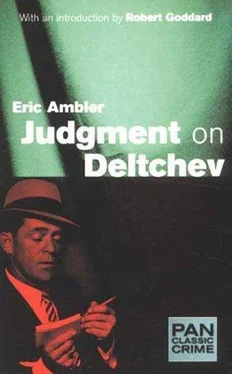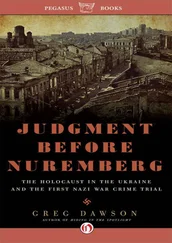Eric Ambler - Judgment on Deltchev
Здесь есть возможность читать онлайн «Eric Ambler - Judgment on Deltchev» весь текст электронной книги совершенно бесплатно (целиком полную версию без сокращений). В некоторых случаях можно слушать аудио, скачать через торрент в формате fb2 и присутствует краткое содержание. Год выпуска: 1977, ISBN: 1977, Издательство: Vintage, Жанр: Криминальный детектив, на английском языке. Описание произведения, (предисловие) а так же отзывы посетителей доступны на портале библиотеки ЛибКат.
- Название:Judgment on Deltchev
- Автор:
- Издательство:Vintage
- Жанр:
- Год:1977
- ISBN:9780307049971
- Рейтинг книги:4 / 5. Голосов: 1
-
Избранное:Добавить в избранное
- Отзывы:
-
Ваша оценка:
- 80
- 1
- 2
- 3
- 4
- 5
Judgment on Deltchev: краткое содержание, описание и аннотация
Предлагаем к чтению аннотацию, описание, краткое содержание или предисловие (зависит от того, что написал сам автор книги «Judgment on Deltchev»). Если вы не нашли необходимую информацию о книге — напишите в комментариях, мы постараемся отыскать её.
Judgment on Deltchev — читать онлайн бесплатно полную книгу (весь текст) целиком
Ниже представлен текст книги, разбитый по страницам. Система сохранения места последней прочитанной страницы, позволяет с удобством читать онлайн бесплатно книгу «Judgment on Deltchev», без необходимости каждый раз заново искать на чём Вы остановились. Поставьте закладку, и сможете в любой момент перейти на страницу, на которой закончили чтение.
Интервал:
Закладка:
‘You look tired, Herr Foster.’
‘I’ve had a tiring twenty-four hours.’
He nodded politely. He did not even look a question.
‘What about today’s evidence? What do you think?’ I asked. ‘It’s more or less what you feared, isn’t it?’
He considered for a moment, then he shook his head. ‘No. I don’t think it is. You see, I expected something possible. I thought that Yordan might have committed some indiscretion capable of being shown badly. But not this. It is really very funny. I know Yordan and I know that he is incapable of this kind of association. And with men of the type of Eftib and Pazar it is grotesque.’
‘He associated with Vukashin and Brankovitch.’
‘He did not like them, but he recognized their importance. Both are considerable men, leaders. But conspiracy with this delinquent riffraff? It is impossible! Yordan is too much of a snob.’
‘What sort of indiscretion did you expect?’
He shrugged. ‘Many things are possible. For example, it would not have greatly surprised me to learn that some of the exiles were planning a coup d’état and had nominated Yordan their leader. If they appealed to him he would be flattered. He might temporize, but he would treat with them. In transactions of that kind many foolish things are written. Now with this, all is different. We have circumstantial evidence of the kind that is used to convict ordinary criminals — the piece of paper with the note on it, the scribbled address, the conspirators who escape and those who do not, the mysterious Pazar, who is missing but really dead — it is all of a different pattern.’ He shrugged again. ‘But that is only what I feel.’
‘What did you mean by saying that Pazar is really dead?’
‘If he were alive they would certainly have found him before the trial. They could not risk his being found unexpectedly. He might be an inconvenient witness and it would look bad if he, too, were killed resisting arrest.’
So then of course I told him. Whatever else was not my business, the problem of the evidence against Deltchev certainly was, and I had come to rely upon Petlarov’s opinions. I told him about the letter I had carried, of the dead man in Patriarch Dimo 9, of Pashik’s arrival, of the visit to Aleko, and of the Aleko note. He listened in silence and was silent for a time when I had finished. I noticed that he had gone very pale. Then he put down his drink and stood up.
‘Herr Foster,’ he said slowly, ‘I too have something to tell you. Every two days I have to report to the police to get my papers stamped. It is part of the control to which, as an untrustworthy person, I am subject. Today when I reported, I was warned. I was told that I had recently made an undesirable association and that if I did not wish to be removed with my wife to a labour camp, the association must cease. That was all. Your name was not mentioned.’ He hesitated. ‘When I came here this evening, Herr Foster, I had almost made up my mind to ignore the warning. I thought that if it had been a serious matter I should not have been warned but arrested. I see now that I was wrong.’
‘What do you mean?’
But he did not reply. He was fumbling agitatedly in his pocket. He got out the ration card I had given him and held it out to me.
‘I am sorry, Herr Foster,’ he said, ‘I cannot keep our bargain.’
‘That’s all right. I understand.’ I didn’t, but he was so obviously upset that I wanted to soothe him. ‘Keep the ration card anyway. I don’t want it.’
He shook his head. His face looked pinched and there was sweat on his forehead. I had a curious sense of shock. I had come to think of Petlarov as some kind of genie who inhabited the corridor outside my hotel room, ready to explain, to enlighten, to serve when I needed him. Because his own account of himself had been quite calm and impersonal, because he had not exuded the self-pity I should have been so quick to condemn, I had not found it necessary to think of him as a human being. Now suddenly he was very much a human being; he was frightened. The realization gave me a curious feeling of discomfort.
‘Herr Foster,’ he said, ‘please take the card. I cannot use it any more, and if I am arrested I do not wish to have it found in my pocket.’
I took it. He picked up his hat and went to the door.
‘Just a moment,’ I said.
He stopped. The effort he made to control his agitation was almost painful to watch. He just wanted to be gone.
‘Can’t you give me any idea what this is all about?’ I asked.
For a moment I thought he was going without answering. Then he swallowed and licked his lips. He looked at his hat as he spoke. ‘I will tell you one thing, Herr Foster. K. Fischer, Karl Fischer, you mentioned him.’ He hesitated before he went on with a rush. ‘He was a left-wing politician, very popular in the working-class quarters of Vienna. A good man and a fearless speaker. He was in principle for the Soviets, but still in ’46 he protested against the Soviet kidnappings of Austrians from the American sector. An honest man. He did what he thought right. He was murdered.’ He hesitated and swallowed again.
‘Yes?’
‘In September it was,’ he said. ‘He went out one evening to see his married daughter in Favoriten. Next day the railway police found his body behind a shed in the marshalling yard outside the Ostbahnhof.’ He paused and looked up at me. ‘You said that the man you saw at Patriarch Dimo had been killed by a bullet wound in the back of the head, by the ear.’
‘Yes.’
He nodded. ‘That was how Karl Fischer died,’ he said. ‘That was the hand of Aleko.’
Then he went.
CHAPTER FOURTEEN
That was on Friday, the 14th of June. The assassination took place on the Saturday.
I have since been described in the People’s Party press as ‘a well-known agent of the English secret service’, ‘the leader of a foreign murder gang’, ‘Anglo-American spy and pervert’, and in other less reproducible ways. In one article the fact that I am a writer was acknowledged by a reference to ‘the notorious pornographer and English murder-propaganda lackey Foster’.
That part of it has been less amusing than I would have thought. Some of the stuff was reproduced in London papers, and among my friends the ‘notices of Foster’s Balkan tour’ were quoted hilariously for a day or two. But when the news of the Deltchev verdict came and the mass executions of Agrarian Socialists began, the attacks on me became related to events that were anything but funny. I began to be asked questions which the Foreign Office had suggested I should not answer.
With the newspapers it was not difficult; I did as I had been asked and referred them to the Foreign Office. With friends and acquaintances it was less simple. It is, I find, extraordinarily embarrassing to be described in print as a member of the British secret service. The trouble is that you cannot afterwards convince people that you are not. They reason that if you are a member you will still presumably have to say that you are not. You are suspect. If you say nothing, of course, you admit all. Your denials become peevish. It is very tiresome. Probably the only really effective denial would be a solemn, knowing acknowledgment that there might be some truth in the rumour. But I can never bring myself to it. Foreign Office or no Foreign Office, I have to explain what really happened.
To begin with, I think I should make it clear that I am not one of those persons who enjoy danger. I take pains to avoid it. Moreover, my timidity is speculative and elaborate. For instance, in Paris at the time of the Stavisky riots I was living in a hotel room overlooking a street in which the police fought a revolver battle with rioters. My first impulse was to lean out of the window and watch. The firing was several hundred yards away and I knew perfectly well that at that distance a revolver is about as dangerous as a water pistol. What I remembered, however, was that the author of Way of Revelation had had a similar impulse of curiosity in Mexico City and died of it, absurdly, with a stray bullet through his head. Instead of leaning out of the window, therefore, I had knelt on the floor by it and tried to use my shaving mirror as a periscope; but by the time I had arranged all this, the battle was over and I saw nothing but an indignant woman with an upset shopping bag.
Читать дальшеИнтервал:
Закладка:
Похожие книги на «Judgment on Deltchev»
Представляем Вашему вниманию похожие книги на «Judgment on Deltchev» списком для выбора. Мы отобрали схожую по названию и смыслу литературу в надежде предоставить читателям больше вариантов отыскать новые, интересные, ещё непрочитанные произведения.
Обсуждение, отзывы о книге «Judgment on Deltchev» и просто собственные мнения читателей. Оставьте ваши комментарии, напишите, что Вы думаете о произведении, его смысле или главных героях. Укажите что конкретно понравилось, а что нет, и почему Вы так считаете.












